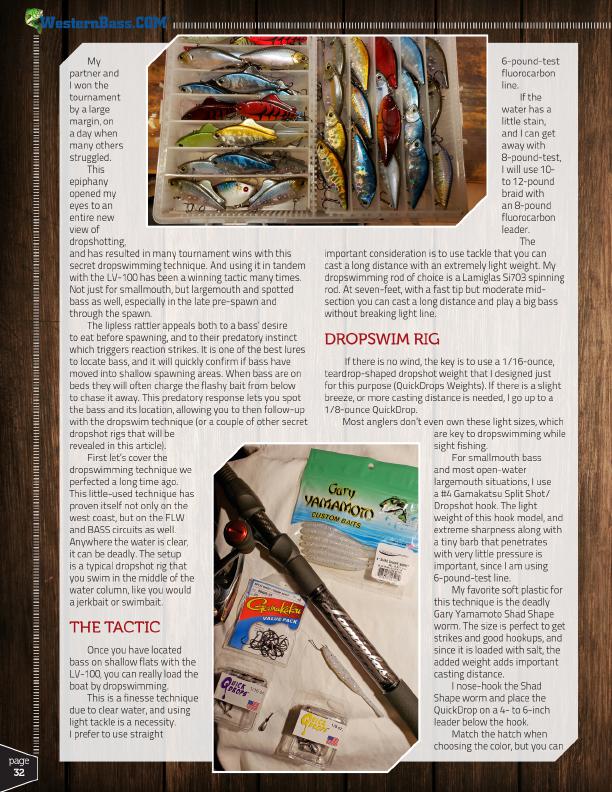
Spring 2021
page
32
®
My partner and I won the tournament by a large margin, on a day when many others struggled.
This epiphany opened my eyes to an entire new view of dropshotting, and has resulted in many tournament wins with this secret dropswimming technique. And using it in tandem with the LV-100 has been a winning tactic many times. Not just for smallmouth, but largemouth and spotted bass as well, especially in the late pre-spawn and through the spawn.
The lipless rattler appeals both to a bass’ desire to eat before spawning, and to their predatory instinct which triggers reaction strikes. It is one of the best lures to locate bass, and it will quickly confirm if bass have moved into shallow spawning areas. When bass are on beds they will often charge the flashy bait from below to chase it away. This predatory response lets you spot the bass and its location, allowing you to then follow-up with the dropswim technique (or a couple of other secret dropshot rigs that will be revealed in this article).
First let’s cover the dropswimming technique we perfected a long time ago. This little-used technique has proven itself not only on the west coast, but on the FLW and BASS circuits as well. Anywhere the water is clear, it can be deadly. The setup is a typical dropshot rig that you swim in the middle of the water column, like you would a jerkbait or swimbait.
THE TACTIC
Once you have located bass on shallow flats with the LV-100, you can really load the boat by dropswimming.
This is a finesse technique due to clear water, and using light tackle is a necessity. I prefer to use straight
6-pound-test
fluorocarbon
line.
If the
water has a
little stain,
and I can get
away with
8-pound-test,
I will use 10-
to 12-pound
braid with
an 8-pound
fluorocarbon
leader.
The important consideration is to use tackle that you can cast a long distance with an extremely light weight. My dropswimming rod of choice is a Lamiglas Si703 spinning rod. At seven-feet, with a fast tip but moderate mid- section you can cast a long distance and play a big bass without breaking light line.
DROPSWIM RIG
If there is no wind, the key is to use a 1/16-ounce, teardrop-shaped dropshot weight that I designed just for this purpose (QuickDrops Weights). If there is a slight breeze, or more casting distance is needed, I go up to a 1/8-ounce QuickDrop.
Most anglers don’t even own these light sizes, which
are key to dropswimming while
sight fishing.
For smallmouth bass
and most open-water
largemouth situations, I use
a #4 Gamakatsu Split Shot/
Dropshot hook. The light
weight of this hook model, and
extreme sharpness along with
a tiny barb that penetrates
with very little pressure is
important, since I am using
6-pound-test line.
My favorite soft plastic for
this technique is the deadly
Gary Yamamoto Shad Shape
worm. The size is perfect to get
strikes and good hookups, and
since it is loaded with salt, the
added weight adds important
casting distance.
I nose-hook the Shad
Shape worm and place the
QuickDrop on a 4- to 6-inch
leader below the hook.
Match the hatch when
choosing the color, but you can